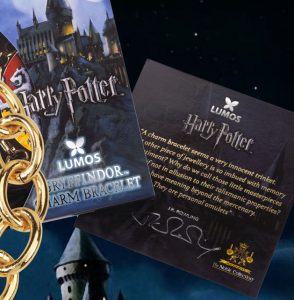New from J.K. Rowling
Draco Malfoy grew up as an only child at Malfoy Manor, the magnificent mansion in Wiltshire which had been in his family’s possession for many centuries. From the time when he could talk, it was made clear to him that he was triply special: firstly as a wizard, secondly as a pure-blood, and thirdly as a member of the Malfoy family.
Draco was raised in an atmosphere of regret that the Dark Lord had not succeeded in taking command of the wizarding community, although he was prudently reminded that such sentiments ought not to be expressed outside the small circle of the family and their close friends ‘or Daddy might get into trouble’. In childhood, Draco associated mainly with the pure-blood children of his father’s ex-Death Eater cronies, and therefore arrived at Hogwarts with a small gang of friends already made, including Theodore Nott and Vincent Crabbe.
Like every other child of Harry Potter’s age, Draco heard stories of the Boy Who Lived through his youth. Many different theories had been in circulation for years as to how Harry survived what should have been a lethal attack, and one of the most persistent was that Harry himself was a great Dark wizard. The fact that he had been removed from the wizarding community seemed (to wishful thinkers) to support this view, and Draco’s father, wily Lucius Malfoy, was one of those who subscribed most eagerly to the theory. It was comforting to think that he, Lucius, might be in for a second chance of world domination, should this Potter boy prove to be another, and greater, pure-blood champion. It was, therefore, in the knowledge that he was doing nothing of which his father would disapprove, and in the hope that he might be able to relay some interesting news home, that Draco Malfoy offered Harry Potter his hand when he realised who he was on the Hogwarts Express. Harry’s refusal of Draco’s friendly overtures, and the fact that he had already formed allegiance to Ron Weasley, whose family is anathema to the Malfoys, turns Malfoy against him at once. Draco realised, correctly, that the wild hopes of the ex-Death Eaters – that Harry Potter was another, and better, Voldemort – are completely unfounded, and their mutual enmity is assured from that point.
Much of Draco’s behaviour at school was modelled on the most impressive person he knew – his father – and he faithfully copied Lucius’s cold and contemptuous manner to everyone outside his inner circle. Having recruited a second henchman (Crabbe being already in position pre-Hogwarts) on the train to school, the less physically imposing Malfoy used Crabbe and Goyle as a combination of henchman and bodyguard throughout his six years of school life.
Draco’s feelings for Harry were always based, in a great part, on envy. Though he never sought fame, Harry was unquestionably the most talked-about and admired person at school, and this naturally jarred with a boy who had been brought up to believe that he occupied an almost royal position within the wizarding community. What was more, Harry was most talented at flying, the one skill at which Malfoy had been confident he would outshine all the other first-years. The fact that the Potions master, Snape, had a soft spot for Malfoy, and despised Harry, was only slight compensation.
Draco resorted to many different dirty tactics in his perpetual quest to get under Harry’s skin, or discredit him in the eyes of others including, but not limited to, telling lies about him to the press, manufacturing insulting badges to wear about him, attempting to curse him from behind, and dressing up as one of the Dementors (to which Harry had shown himself particularly vulnerable). However, Malfoy had his own moments of humiliation at Harry’s hands, notably on the Quidditch pitch, and never forgot the shame of being turned into a bouncing ferret by a Defence Against the Dark Arts teacher.
While many people thought that Harry Potter, who had witnessed the Dark Lord’s rebirth, was a liar or a fantasist, Draco Malfoy was one of the few who knew that Harry was telling the truth. His own father had felt his Dark Mark burn and had flown to rejoin the Dark Lord, witnessing Harry and Voldemort’s graveyard duel.
The discussions of these events at Malfoy Manor gave rise to conflicting sensations in Draco Malfoy. On the one hand, he was thrilled by the secret knowledge that Voldemort had returned, and that what his father had always described as the family’s glory days were back once more. On the other, the whispered discussions about the way that Harry had, again, evaded the Dark Lord’s attempts to kill him, caused Draco further twinges of anger and envy. Much as the Death Eaters disliked Harry as an obstacle and as a symbol, he was discussed seriously as an adversary, whereas Draco was still relegated to the status of schoolboy by Death Eaters who met at his parents’ house. Though they were on opposing sides of the gathering battle, Draco felt envious of Harry’s status. He cheered himself up by imagining Voldemort’s triumph, seeing his family honoured under a new regime, and he himself feted at Hogwarts as the important and impressive son of Voldemort’s second-in-command.
School life took an upturn in Draco’s fifth year. Although forbidden to discuss at Hogwarts what he had heard at home, Draco took pleasure in petty triumphs: he was a Prefect (and Harry was not) and Dolores Umbridge, the new Defence Against the Dark Arts teacher, seemed to loathe Harry quite as much as he did. He became a member of Dolores Umbridge’s Inquisitorial Squad, and made it his business to try and discover what Harry and a gang of disparate students were up to, as they formed and trained, in secret, as the forbidden organisation, Dumbledore’s Army. However, at the very moment of triumph, when Draco had cornered Harry and his comrades, and when it seemed that Harry must be expelled by Umbridge, Harry slipped through his fingers. Worse still, Harry managed to thwart Lucius Malfoy’s attempt to kill him, and Draco’s father was captured and sent to Azkaban.
Draco’s world now fell apart. From having been, as he and his father had believed, on the cusp of authority and prestige such as they had never known before, his father was taken from the family home and imprisoned, far away, in the fearsome wizard prison guarded by Dementors. Lucius had been Draco’s role model and hero since birth. Now he and his mother were pariahs among the Death Eaters; Lucius was a failure and discredited in the eyes of the furious Lord Voldemort.
Draco’s existence had been cloistered and protected until this point; he had been a privileged boy with little to trouble him, assured of his status in the world and with his head full of petty concerns. Now, with his father gone and his mother distraught and afraid, he had to assume a man’s responsibilities.
Worse was to come. Voldemort, seeking to punish Lucius Malfoy still further for the botched capture of Harry, demanded that Draco perform a task so difficult that he would almost certainly fail – and pay with his life. Draco was to murder Albus Dumbledore – how, Voldemort did not trouble to say. Draco was to be left to his own initiative and Narcissa guessed, correctly, that her son was being set up to fail by a wizard who was devoid of pity and could not tolerate failure.
Furious at the world that seemed suddenly to have turned on his father, Draco accepted full membership of the Death Eaters and agreed to perform the murder Voldemort ordered. At this early stage, full of the desire for revenge and to return his father to Voldemort’s favour, Draco barely comprehended what he was being asked to do. All he knew was that Dumbledore represented everything his imprisoned father disliked; Draco managed, quite easily, to convince himself that he, too, thought the world would be a better place without the Hogwarts Headmaster, around whom opposition to Voldemort had always rallied.
In thrall to the idea of himself as a real Death Eater, Draco set off for Hogwarts with a burning sense of purpose. Gradually, however, as he found that his task was much more difficult than he had anticipated, and after he had come close to accidentally killing two other people instead of Dumbledore, Draco’s nerve began to fail. With the threat of harm to his family and himself hanging over him, he began to crumble under the pressure. The ideas that Draco had about himself, and his place in the world, were disintegrating. All his life, he had idolised a father who advocated violence and was not afraid to use it himself, and now that his son discovered in himself a distaste for murder, he felt it to be a shameful failing. Even so, he could not free himself from his conditioning: he repeatedly refused the assistance of Severus Snape, because he was afraid that Snape would attempt to steal his ‘glory’.
Voldemort and Snape underestimated Draco. He proved an adept at Occlumency (the magical art of repelling attempts to read the mind), which was essential for the undercover work he had undertaken. After two doomed attempts on Dumbledore’s life, Draco succeeded in his ingenious plan to introduce a whole group of Death Eaters into Hogwarts, with the result that Dumbledore was, indeed, killed – though not by Draco’s hand.
Even when faced with a weak and wandless Dumbledore, Draco found himself unable to deliver the coup de grâce because, in spite of himself, he was touched by Dumbledore’s kindness and pity for his would-be killer. Snape subsequently covered for Draco, lying to Voldemort about Draco lowering his wand prior to his own arrival at the top of the Astronomy Tower; Snape emphasised Draco’s skill in introducing the Death Eaters into the school, and cornering Dumbledore for him, Snape, to kill.
When Lucius was freed from Azkaban shortly afterwards, the family was allowed to return to Malfoy Manor with their lives. However, they were now completely discredited. From dreams of the highest status under Voldemort’s new regime, the Malfoys found themselves the lowest in the ranks of the Death Eaters; weaklings and failures, to whom Voldemort was henceforth derisive and contemptuous.
Draco’s changed, yet still conflicted, personality revealed itself in his actions during the remainder of the war between Voldemort and those who were trying to stop him. Although Draco had still not rid himself of the hope of returning the family to their former high position, his inconveniently awakened conscience led him to try – half-heartedly, perhaps, but arguably as best he could in the circumstances – to save Harry from Voldemort when the former was captured and dragged to Malfoy Manor. During the final battle at Hogwarts however, Malfoy made yet another attempt to capture Harry and thereby save his parents’ prestige, and possibly their lives. Whether he could have brought himself to actually hand over Harry is a moot point; I suspect that, as with his attempted murder of Dumbledore, he would again have found the reality of bringing about another person’s death much more difficult in practice than in theory.
Draco survived Voldemort’s siege of Hogwarts because Harry and Ron saved his life. Following the battle, his father evaded prison by providing evidence against fellow Death Eaters, helping to ensure the capture of many of Lord Voldemort’s followers who had fled into hiding.
The events of Draco’s late teens forever changed his life. He had had the beliefs with which he had grown up challenged in the most frightening way: he had experienced terror and despair, seen his parents suffer for their allegiance, and had witnessed the crumbling of all that his family had believed in. People whom Draco had been raised, or else had learned, to hate, such as Dumbledore, had offered him help and kindness, and Harry Potter had given him his life. After the events of the second wizarding war, Lucius found his son as affectionate as ever, but refusing to follow the same old pure-blood line.
Draco married the younger sister of a fellow Slytherin. Astoria Greengrass, who had gone through a similar (though less violent and frightening) conversion from pure-blood ideals to a more tolerant life view, was felt by Narcissa and Lucius to be something of a disappointment as a daughter-in-law. They had had high hopes of a girl whose family featured on the ‘Sacred Twenty-Eight’, but as Astoria refused to raise their grandson Scorpius in the belief that Muggles were scum, family gatherings were often fraught with tension.
J.K. Rowling’s thoughts
When the series begins, Draco is, in almost every way, the archetypal bully. With the unquestioning belief in his own superior status he has imbibed from his pure-blood parents, he initially offers Harry friendship on the assumption that the offer needs only to be made to be accepted. The wealth of his family stands in contrast to the poverty of the Weasleys; this too, is a source of pride to Draco, even though the Weasleys’ blood credentials are identical to his own.
Everybody recognises Draco because everybody has known somebody like him. Such people’s belief in their own superiority can be infuriating, laughable or intimidating, depending on the circumstances in which one meets them. Draco succeeds in provoking all of these feelings in Harry, Ron and Hermione at one time or another.
My British editor questioned the fact that Draco was so accomplished at Occlumency, which Harry (for all his ability in producing a Patronus so young) never mastered. I argued that it was perfectly consistent with Draco’s character that he would find it easy to shut down emotion, to compartmentalise, and to deny essential parts of himself. Dumbledore tells Harry, at the end of Order of the Phoenix, that it is an essential part of his humanity that he can feel such pain; with Draco, I was attempting to show that the denial of pain and the suppression of inner conflict can only lead to a damaged person (who is much more likely to inflict damage on other people).
Draco never realises that he becomes, for the best part of a year, the true owner of the Elder Wand. It is as well that he does not, partly because the Dark Lord is skilled in Legilimency, and would have killed Draco in a heartbeat if he had had an inkling of the truth, but also because, his latent conscience notwithstanding, Draco remains prey to all the temptations that he has been taught to admire – violence and power among them.
I pity Draco, just as I feel sorry for Dudley. Being raised by either the Malfoys or the Dursleys would be a very damaging experience, and Draco undergoes dreadful trials as a direct result of his family’s misguided principles. However, the Malfoys do have a saving grace: they love each other. Draco is motivated quite as much by fear of something happening to his parents as to himself, while Narcissa risks everything when she lies to Voldemort at the end of Deathly Hallows and tells him that Harry is dead, merely so that she can get to her son.
For all this, Draco remains a person of dubious morality in the seven published books, and I have often had cause to remark on how unnerved I have been by the number of girls who fell for this particular fictional character (although I do not discount the appeal of Tom Felton, who plays Draco brilliantly in the films and, ironically, is about the nicest person you could meet). Draco has all the dark glamour of the anti-hero; girls are very apt to romanticise such people. All of this left me in the unenviable position of pouring cold common sense on ardent readers’ daydreams as I told them, rather severely, that Draco was not concealing a heart of gold under all that sneering and prejudice and that no, he and Harry were not destined to end up best friends.
I imagine that Draco grew up to lead a modified version of his father’s existence; independently wealthy, without any need to work, Draco inhabits Malfoy Manor with his wife and son. I see in his hobbies further confirmation of his dual nature. The collection of Dark artefacts harks back to family history, even though he keeps them in glass cases and does not use them. However, his strange interest in alchemical manuscripts, from which he never attempts to make a Philosopher’s Stone, hints at a wish for something other than wealth, perhaps even the wish to be a better man. I have high hopes that he will raise Scorpius to be a much kinder and more tolerant Malfoy than he was in his own youth.
Draco had many surnames before I settled on ‘Malfoy’. At various times in the earliest drafts he is Smart, Spinks or Spungen. His Christian name comes from a constellation – the dragon – and yet his wand core is of unicorn.
This was symbolic. There is, after all – and at the risk of re-kindling unhealthy fantasies – some unextinguished good at the heart of Draco.
Previous writing: « Inferi
Next writing: Order of Merlin »


